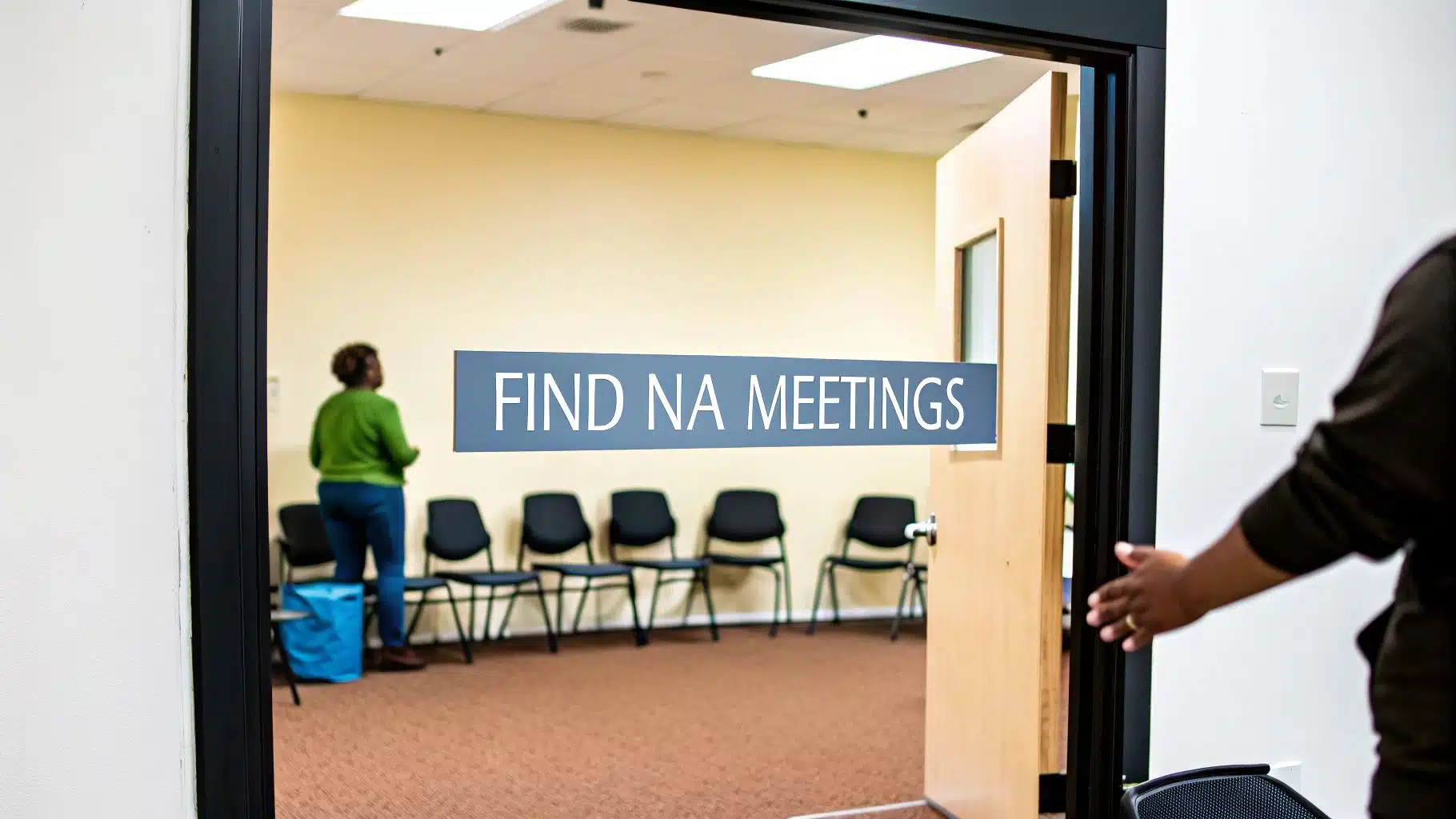
Narcotics Anonymous meetings are a lifeline for anyone looking to break free from drug addiction. They’re free, run by fellow members, and offer a space where you can be honest about your struggles without facing judgment. The whole idea is to help each other stay clean, using the structured 12-step program as a guide.
What Is the Purpose of Narcotics Anonymous
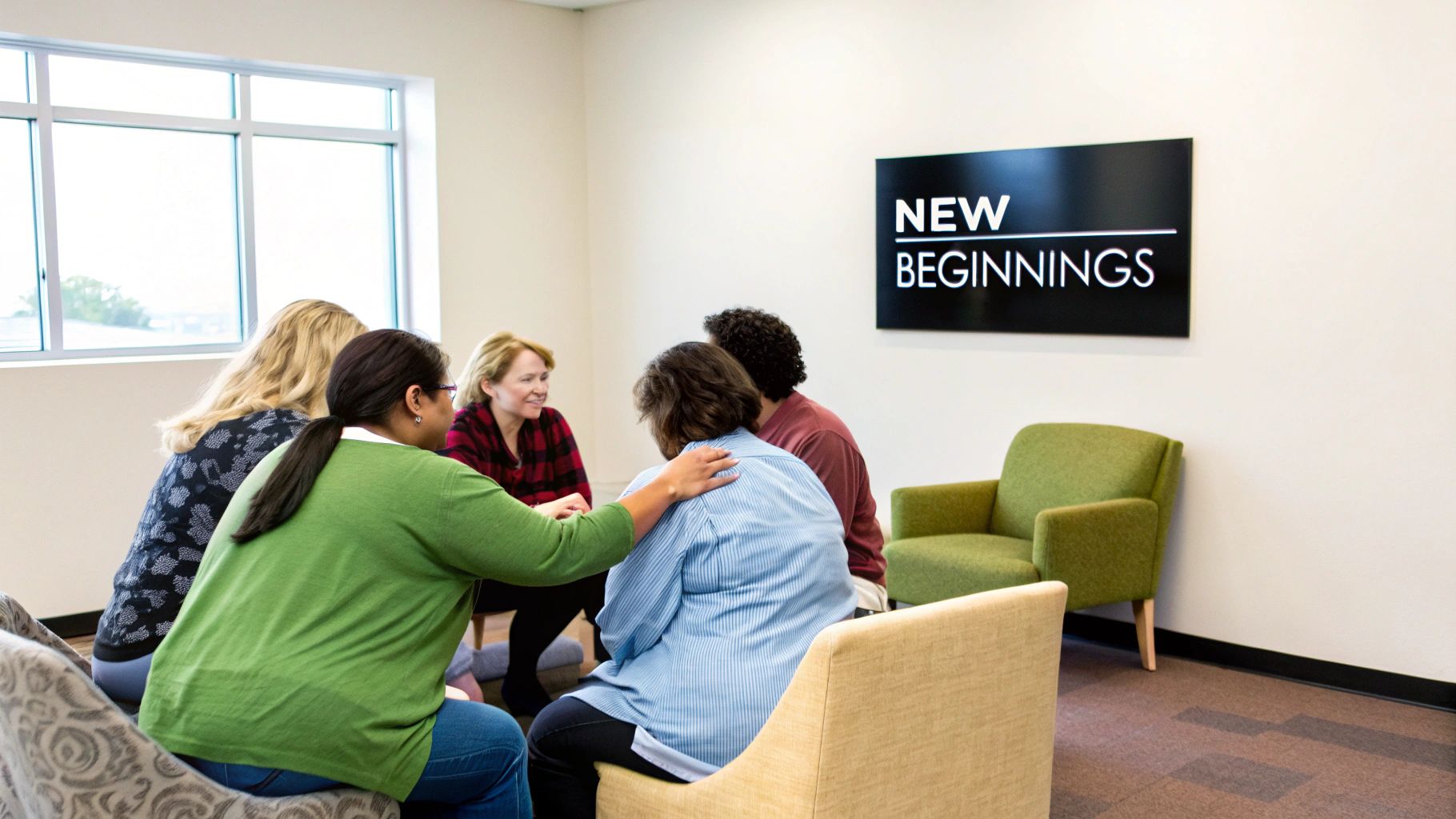
Think of NA meetings as a safe harbor in a storm. When you’re lost in the chaos of addiction, these gatherings offer a steady beacon of hope, community, and a clear path forward.
At its heart, NA isn’t a medical clinic or a formal institution. It’s a non-profit fellowship of equals. You won’t find doctors or therapists leading the discussion, and there are no fees to walk through the door. The entire program is built on one powerful idea: one addict helping another.
This peer-to-peer connection is what makes it work. It fosters a level of empathy you just can’t find anywhere else, creating a space where people feel safe enough to open up about their darkest moments. Everyone in the room gets it because they’ve been there themselves.
A Foundation of Shared Experience
The main point of any NA meeting is to create a place where members can share their experiences—the good, the bad, and the hopeful. This simple act of sharing shatters the crushing isolation that addiction thrives on. Suddenly, you realize you’re not alone.
The collective wisdom of the group becomes an incredible resource for your own recovery.
While every group runs itself, most meetings have a familiar rhythm. You can generally expect:
- Readings: The group will often read passages from NA literature that lay out the core ideas of the program.
- Sharing: Members get a chance to talk about where they are in their recovery journey.
- Support: The focus stays on finding positive solutions and helping each other stay clean, one day at a time.
This straightforward approach has proven incredibly effective. Today, Narcotics Anonymous hosts over 63,000 weekly meetings in 132 countries, making it one of the most widespread and accessible recovery fellowships on the planet.
“The therapeutic value of one addict helping another is without parallel. We feel that our way is practical, for one addict can best understand and help another addict.”
This quote gets to the core of what NA is all about. It’s not about getting professional advice; it’s about the profound, life-saving connection that comes from shared human experience. You can get a deeper understanding of the program in our guide to Narcotics Anonymous.
Ultimately, these meetings provide a consistent, reliable, and completely free resource for anyone who wants to stop using drugs and build a better life.
Exploring Different Types of NA Meetings
Stepping into recovery is a huge deal, and finding the right meeting can make all the difference. It’s important to know that not all Narcotics Anonymous meetings are the same. Just like a coffee shop has everything from a straight-up espresso to a fancy latte, NA offers a variety of meeting formats to fit what different people need.
Getting a feel for these different styles ahead of time can help you find a group where you feel truly comfortable and understood. Each one has its own vibe and purpose, creating unique spaces for connection and healing.
The image below gives you a sense of just how widespread NA is, with details on its weekly meetings and global presence.
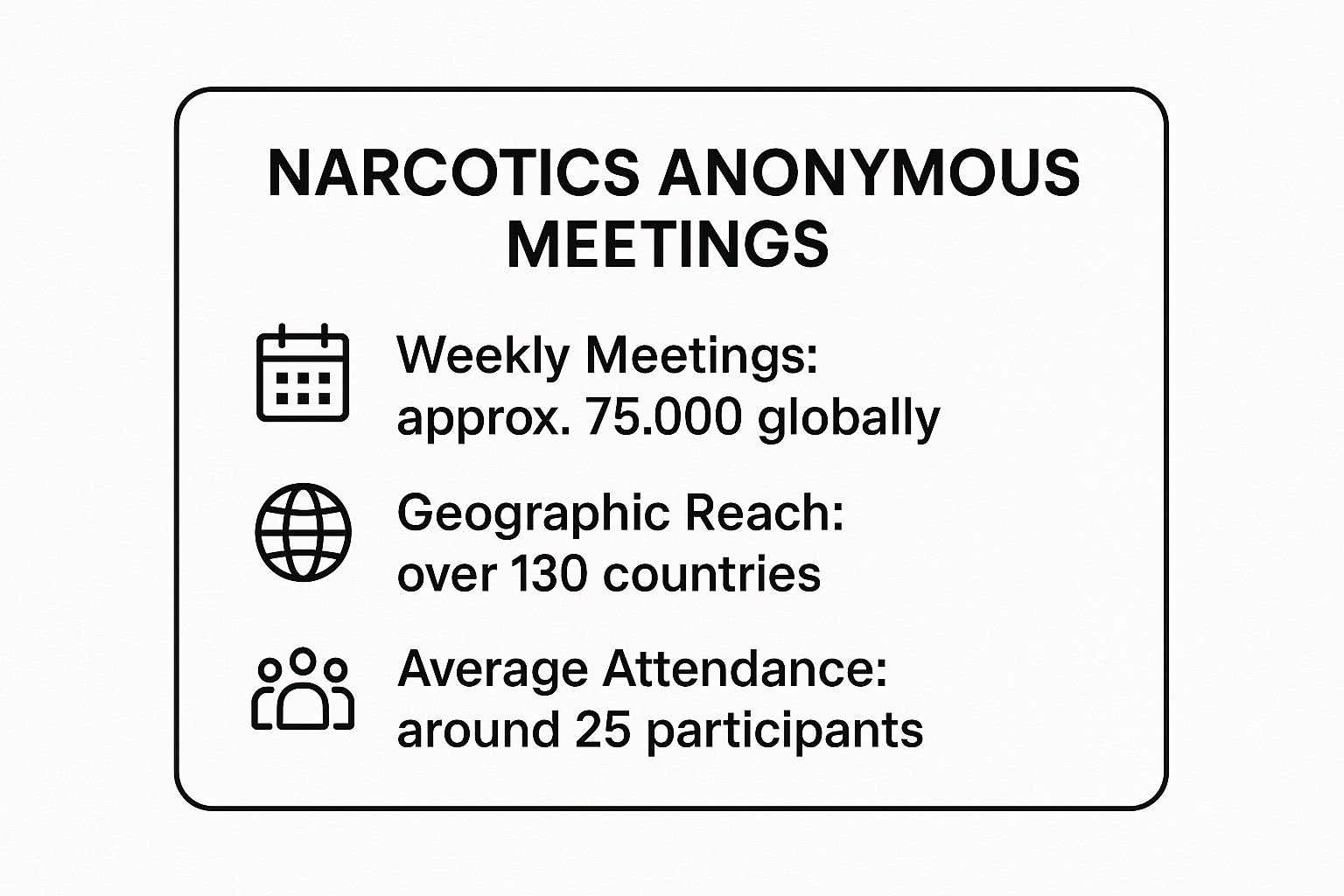
As you can see, NA is a massive network. It’s a powerful reminder that no matter where you are, you’re not alone and support is likely just around the corner.
Open Vs Closed Meetings
The first and most basic difference you’ll come across is between “Open” and “Closed” meetings. You can think of it as the difference between a public town hall and a private club meeting—both have their place, but they serve different people.
An Open Meeting is for literally anyone. Friends, family members, students, or even a healthcare professional who wants to learn more are all welcome. These are fantastic for loved ones who want to understand addiction and what your recovery journey looks like.
A Closed Meeting, on the other hand, is exclusively for people who have a desire to stop using drugs. This creates a really safe, tight-knit atmosphere where you can share openly with others who just get it. For many people walking in for the first time, the immediate sense of shared experience in a closed meeting is incredibly powerful.
Comparison Of Common NA Meeting Formats
Beyond the simple Open vs. Closed distinction, NA meetings come in several other flavors. To help you choose the one that feels right for you, here’s a quick breakdown of the most common formats you’ll find.
| Meeting Type | Primary Purpose | Who Can Attend | Typical Format |
|---|---|---|---|
| Speaker Meeting | Inspiration and hope | Usually open to all | One or more members share their personal recovery story in detail. |
| Discussion Meeting | Group sharing and connection | Can be open or closed | A chairperson picks a topic, and members share their thoughts and experiences. |
| Step Study | In-depth program learning | Typically closed meetings | The group focuses on one of the 12 Steps to understand how to apply it. |
| Book Study | Exploring NA literature | Often closed meetings | Members read and discuss passages from NA books like the Basic Text. |
Each format offers a unique path to connect with the program and with other people in recovery. Finding the one that resonates with you can make your journey feel more personal and sustainable.
Other Common Meeting Formats
Diving a bit deeper, each of those meeting styles offers a distinct way to engage with recovery, keeping the process from ever feeling stale.
Here’s a little more on what to expect:
- Speaker Meetings: This is where you get to hear someone’s story, from start to finish. Listening to a person detail their journey from the depths of addiction to a life in recovery is often what gives newcomers that first real spark of hope. It’s living proof that this thing works.
- Discussion Meetings: These are all about interaction. A leader, or chairperson, will kick things off with a topic—maybe a specific reading or a general theme like “gratitude”—and then the floor opens up for others to share what it means to them.
- Step Study Meetings: If you want to really get into the nuts and bolts of the program, this is the place. These meetings zero in on one of the 12 Steps, giving everyone a chance to talk about what it means, how they’ve worked it, or what challenges they’re facing with it.
It’s also worth noting that while NA’s peer support is incredible, many people find success by pairing meetings with professional guidance. Combining the community of NA with the structure of a treatment program can build an even stronger foundation for recovery. Exploring outpatient addiction treatment programs is a great way to see what additional support might be right for you.
How to Find Local and Online NA Meetings
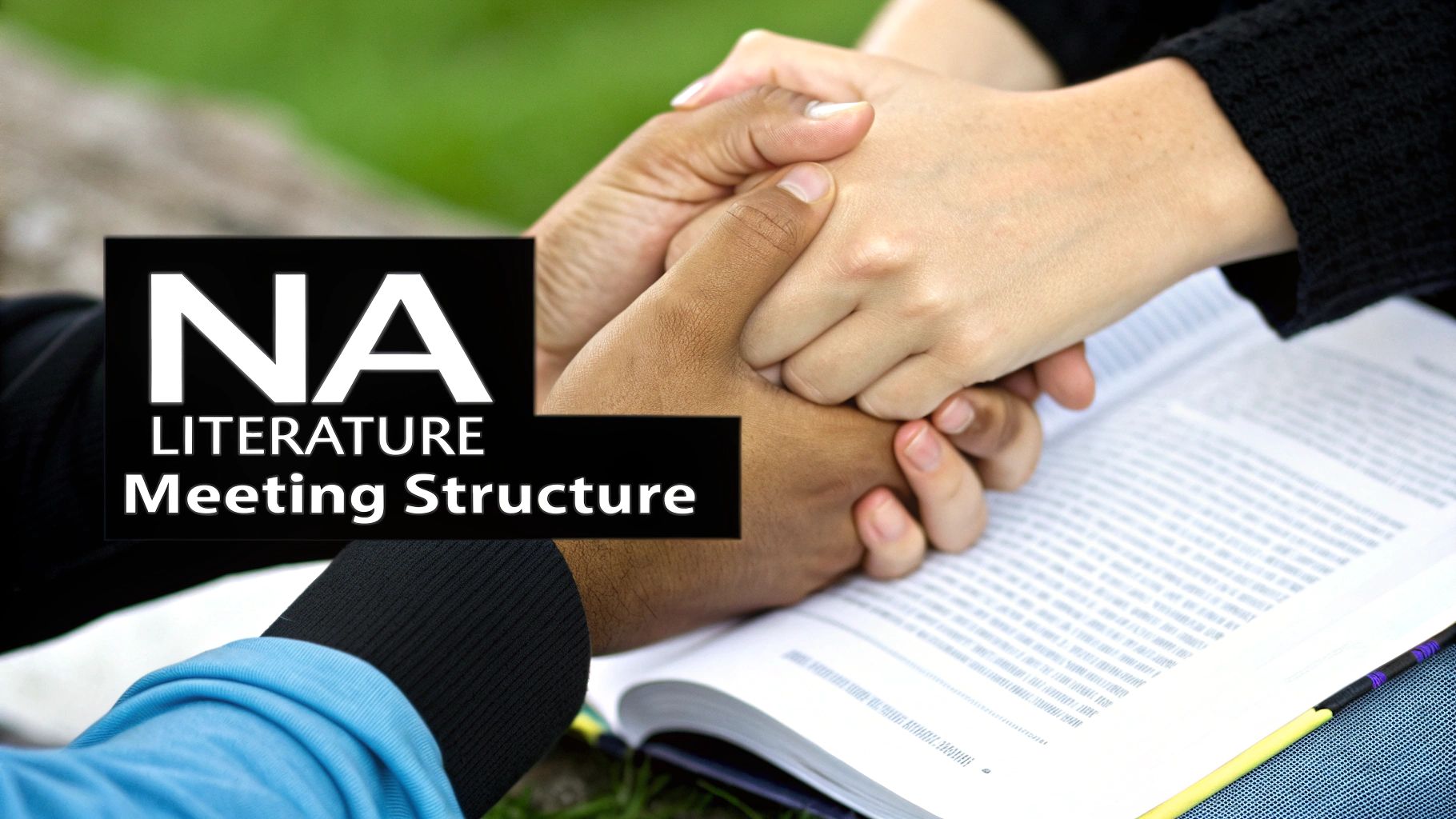
So, you’re ready to find a meeting. That’s a huge step. The good news is that locating a supportive group is easier than ever, whether you’re looking for a face-to-face connection or the convenience of joining from home. Think of finding a meeting like finding a charging station when your phone battery is flashing red—it’s where you go to get the energy and connection you need to keep moving forward.
Using Official NA Resources
Your best bet for accurate, up-to-date information is to go straight to the source: the official Narcotics Anonymous World Services (NAWS) website. It’s essentially the master directory for every registered NA meeting on the planet, and it’s built to be user-friendly.
Just head to their meeting locator tool and plug in your city, state, or zip code. It will pull up a list of nearby meetings with all the essential details you’ll need:
- Meeting Name: Groups often have names like the “Hometown Group” or “Giving It Away Group.”
- Time and Day: So you know exactly when to go.
- Location Address: The physical address for the church, community center, or clubhouse hosting the meeting.
- Meeting Type: This tells you if it’s an Open, Closed, Speaker, or other type of meeting.
Many local NA areas also run their own websites with more specific regional information. A quick search for “[Your City] Narcotics Anonymous” will almost always point you in the right direction.
Call Now – Your Journey to Recovery Begins Today!

Take the first step towards a healthier life! Call now to connect with our compassionate team and start your recovery journey today. Your path to healing awaits!
Our recovery specialists are available 24/7 to provide support, and all calls are confidential and free. Reach out anytime – we’re here to help!
The Rise of Virtual NA Meetings
While in-person meetings have always been the heart of the fellowship, the world of recovery support has grown. Online Narcotics Anonymous meetings are now a critical resource, offering a level of flexibility and access that just wasn’t possible before.
This shift became incredibly clear during the global pandemic. The need for support didn’t vanish, so the community adapted. In fact, one study found that as in-person attendance dropped to an average of 0.75 meetings per week, virtual attendance shot up to 4.13 meetings per week. You can see the full data and its impact on recovery in this study on peer support during the pandemic.
“Virtual meetings tear down barriers. Whether you’re dealing with a lack of transportation, childcare issues, or social anxiety, online platforms ensure anyone, anywhere can find support the moment they need it.”
These online gatherings usually happen on platforms like Zoom and follow the same formats you’d find in person—Speaker meetings, Step Studies, and Open Discussions are all available right from your phone or computer. This is a game-changer, especially for people in rural areas or those with tricky schedules. You can join a meeting in a different time zone or even a different country to find a group that clicks with you.
Actionable Steps to Find Your Meeting
Finding a strong support system is a cornerstone of recovery, but sometimes peer groups are just one part of the picture. If you feel you need a more structured level of care, it’s a good idea to learn about your options and understand how to get into rehab.
Ready to find a meeting right now? Here’s a simple game plan:
- Start at the Source: Head straight to the Narcotics Anonymous World Services website and use their “Meeting Search” tool. It’s the most reliable resource out there.
- Get the App: Search your phone’s app store for the “NA Meeting Search” app. It uses your location to find the closest meetings happening in real-time.
- Check Out Virtual Options: The NAWS website has a search filter specifically for virtual meetings. You’ll find links and login info for meetings happening around the clock.
- Shop Around: Don’t get discouraged if the first meeting you attend doesn’t feel right. Every group has its own vibe. Try a few different ones until you find a community that feels like home.
What to Expect at Your First Meeting
Walking through the doors of your first Narcotics Anonymous meeting can be a nerve-wracking experience. That blend of hope and fear is something almost everyone feels, and it’s completely normal. The best way to calm those nerves is to get a clearer picture of what actually happens inside, so you can walk in feeling prepared instead of uncertain.
The first thing you’ll likely notice is just how… normal it all is. It’s not a clinical setting with doctors and therapists. It’s just a room full of everyday people, sitting in a circle, who share one common goal: to stay clean and help each other do the same. The atmosphere is casual, welcoming, and built on mutual respect.
The General Flow of a Meeting
While every NA group has its own unique vibe, most Narcotics Anonymous meetings follow a pretty consistent and simple format. This predictable rhythm makes it easy for anyone to follow along, even if it’s your first time.
Here’s a rough breakdown of how a meeting usually goes:
- Welcome and Opening Readings: A chairperson kicks things off, welcoming everyone and giving a special shout-out to any newcomers. Then, they’ll ask for volunteers to read short passages from NA literature, like “Who is an Addict?” or “What is the NA Program?” These readings help center the room and set a positive tone.
- Celebrating Clean Time: Many meetings take a moment to celebrate recovery anniversaries. You’ll see people get key tags or chips to mark milestones—from 30 days to many, many years. It’s a genuinely powerful part of the meeting, reminding everyone that recovery isn’t just a dream, it’s a reality.
- Sharing: This is the core of the meeting. The chairperson might open the floor for anyone to share what’s on their mind, or they might suggest a specific topic related to recovery. One by one, members talk about their personal experiences—their struggles, their victories, and the lessons they’re learning along the way.
- Closing: Meetings are respectful of your time and end promptly, usually after an hour or 90 minutes. They typically wrap up with a group prayer, like the Serenity Prayer, or just a quiet moment of reflection.
You Will Never Be Forced to Speak
This is probably the single most important thing to know: you are not required to share. It’s perfectly okay to just sit and listen for your first few meetings, or for as long as you need. There is absolutely no pressure.
Anonymity is the bedrock of NA, creating a safe space where people can be honest and vulnerable without fear of judgment. No one is going to put you on the spot or single you out. Your only job is to be present, listen for a message of hope, and see if you can relate to the stories you hear.
“The real magic of an NA meeting is finding the similarities, not the differences. It’s about hearing your own story in someone else’s words. That’s where the connection—and the healing—truly begins.”
When you do decide you’re ready to speak, all you have to do is introduce yourself by your first name. That’s it. This small tradition reinforces the idea that in that room, everyone is equal.
Understanding NA Traditions and Etiquette
A few simple customs help keep meetings focused and running smoothly. Knowing them ahead of time can make you feel a little more comfortable. For instance, at some point, you’ll see a basket being passed around.
This is for the 7th Tradition, which says that every NA group pays its own way. The money collected covers the basics:
- Rent for the meeting space
- Coffee, tea, and other refreshments
- NA books and pamphlets
- The key tags for clean-time anniversaries
Donating is completely voluntary. No one is watching or keeping score. As a newcomer, you are considered a guest—just focus on being there.
By understanding this simple structure, you can walk into any of the thousands of Narcotics Anonymous meetings worldwide feeling a little more prepared and a lot more ready to get the support you’re looking for.
Getting the Most Out of Your First Few Meetings
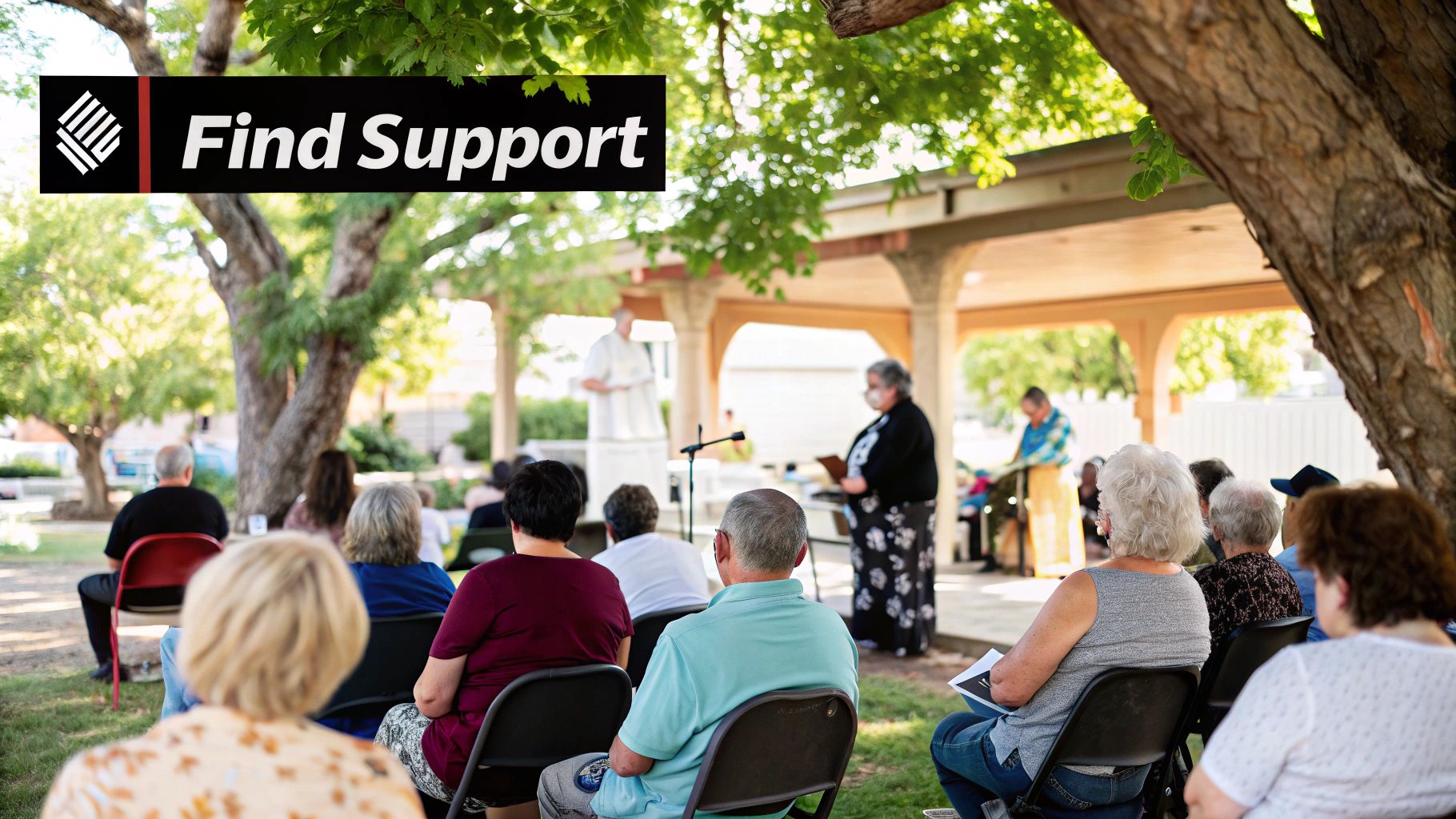
Walking through the door of your first meeting is a huge win, but the real work starts in those first few days and weeks. To turn that first visit into a solid foundation for your recovery, there are a few things you can do. The most common advice you’ll hear is also the most powerful: Keep Coming Back.
This isn’t just a catchy phrase; it’s the core strategy. By simply showing up, again and again, you begin to build a healthy new routine. It’s a way of carving out a safe space in your life, one that chips away at the old, destructive patterns and reminds you that you’re no longer fighting this battle alone.
Find Your Home Group
You might not click with the very first meeting you attend, and that’s perfectly okay. Every group has its own unique vibe, a different mix of personalities and stories. That’s why it’s a good idea to “shop around” a bit and visit a few different Narcotics Anonymous meetings.
Try meetings on different nights of the week or in other parts of town. You might find that a quiet, focused Step Study group resonates more with you than a large Speaker meeting. The goal is to find your “home group”—that one meeting you commit to attending every week. It’s where you’ll start to build real trust and form the friendships that see you through.
“Recovery isn’t just about stopping drug use; it’s about building a new life. Your home group becomes the supportive community where you can learn to live that new life, one day at a time.”
Build Your Support Network
While the group as a whole offers incredible strength, it’s those one-on-one connections that will become your lifeline on tough days. One of the best ways to start building that network is by grabbing a few phone numbers after the meeting. I know it can feel awkward, but people in NA expect it and are genuinely happy to offer their support.
Having a list of people to call when a craving hits or when you just need to hear a friendly voice is a game-changer. It shatters the isolation that addiction feeds on. If you’re on the other side, trying to support a loved one, our guide on how to help someone with addiction can offer some valuable perspective.
Lastly, think about finding a sponsor. A sponsor is simply another recovering addict with a bit more clean time under their belt who can guide you through the 12 Steps. Think of them as a mentor—someone who has walked the path you’re on and can share their experience to help you navigate early recovery.
Call Now – Your Journey to Recovery Begins Today!

Take the first step towards a healthier life! Call now to connect with our compassionate team and start your recovery journey today. Your path to healing awaits!
Our recovery specialists are available 24/7 to provide support, and all calls are confidential and free. Reach out anytime – we’re here to help!
Answering Your Questions About NA Meetings
It’s completely normal to feel a bit nervous before your first Narcotics Anonymous meeting. Walking into a new place with new people can be daunting, but a little information can go a long way in easing those first-time jitters. Let’s tackle some of the most common questions people have so you can feel more comfortable from the moment you arrive.
One of the biggest questions right off the bat is about religion. People see the word “God” mentioned in the 12 Steps and wonder if they’re walking into a church service. The short answer is a definite no.
NA is a spiritual program, but it is not a religious one. You’ll hear talk of a “Higher Power,” but that’s a concept you get to define for yourself. For some, that might be the God they grew up with. For many others, it’s nature, the universe, or even the collective strength and honesty of the group itself. The point is to find a source of strength outside of yourself, whatever that may look like for you.
Do I Have to Call Myself an Addict?
This is another big one. The idea of adopting a label can feel heavy, and nobody in NA will ever make you do it.
While it’s common to hear people introduce themselves with, “Hi, I’m [Name], and I’m an addict,” that’s a personal choice, not a requirement. The only thing you need to attend most NA meetings is a desire to stop using. You can just say your first name. The focus is on finding a solution together, not on labels.
Is There a Fee to Attend NA Meetings?
This is a simple one: Narcotics Anonymous meetings are completely free. You will never be charged a fee to walk through the door.
During the meeting, you’ll likely see a basket get passed around. This is for small, voluntary donations from members to help the group pay for things like rent for the meeting space, coffee, and NA literature. It’s based on what NA calls its 7th Tradition—the idea that each group supports itself. As a newcomer, please don’t feel any pressure to put anything in. Just pass the basket along.
What if I See Someone I Know?
Running into a coworker, neighbor, or old friend can feel awkward, but anonymity is the bedrock of the entire program. It’s taken very seriously to make sure everyone feels safe enough to be vulnerable.
“Anonymity is the spiritual foundation of all our Traditions, ever reminding us to place principles before personalities.”
This core principle means that who you see and what you hear in a meeting stays in that meeting. It’s a space built on mutual trust and respect. If you see someone you know, remember they’re there for the same reason you are. This shared commitment to privacy is what allows people to open up without fear.
It’s also good to know that there are many paths to recovery. You can explore different support groups for addiction to find the one that feels right for you. Ultimately, this foundation of trust helps build a strong, supportive community for everyone who walks through the door.
At Addiction helpline America, we know that taking the first step can be the hardest one. If you or someone you care about needs confidential support or help finding the right path forward, we’re here for you 24/7. Call us for a free, private conversation at https://addictionhelplineamerica.com.
Our helpline is 100%
free & confidential
If you or someone you care about is struggling with drug or alcohol addiction, we can help you explore your recovery options. Don’t face this challenge alone—seek support from us.
Programs
Get 24/7 Addiction Support: Free & Confidential Helpline
Will my insurance
cover addiction
treatment?
We're ready to help
Find the best
drug or alcohol treatment
center
Are you or a loved one struggling with addiction? Call today to speak to a treatment expert.















